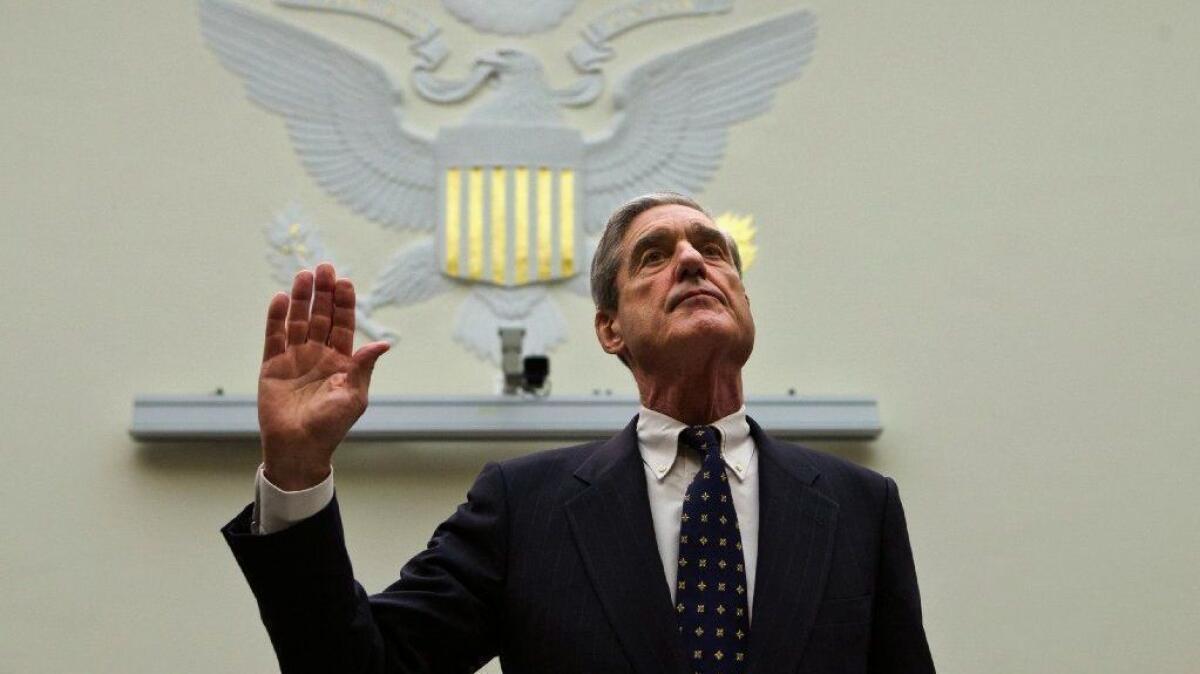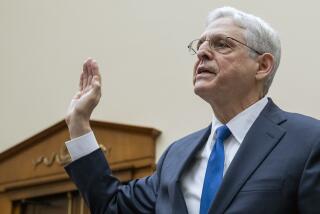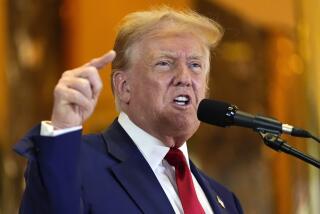Robert Mueller defends Russia probe — and points out Roger Stone remains a felon

WASHINGTON — Former special counsel Robert S. Mueller III on Saturday fervently defended the prosecution of Roger Stone as part of his investigation into Russia’s role in the 2016 election, a day after President Trump commuted the prison sentence of his longtime friend and advisor.
“Stone was prosecuted and convicted because he committed federal crimes. He remains a convicted felon, and rightly so,” Mueller wrote in a Washington Post op-ed that marked his most ardent defense of his two-year probe and his first public remarks since he testified to Congress last July.
Trump’s decision to commute Stone’s 40-month prison sentence, which was scheduled to begin Tuesday, was widely expected in Washington as Trump had long telegraphed that he might offer clemency to his friend.
But it still represented a remarkable defiance of the norms of the Oval Office. A federal jury convicted Stone of seven felony charges, including lying to Congress and witness tampering, in what prosecutors saw as an effort to shield the president from scrutiny.
By contrast, President Nixon did not commute the sentences of his political allies during the Watergate investigation that ultimately forced him to resign in 1974.
Trump’s decision was widely condemned by Democrats on Capitol Hill, who pledged to investigate, and by a handful of Republicans.
House Speaker Nancy Pelosi (D-San Francisco) called Trump’s move an act of “staggering corruption” and promised Democrats would pursue legislation to prevent a similar move in the future.
Rep. Adam B. Schiff (D-Burbank), who led the House impeachment of Trump last year, said the decision was among Trump’s “most offensive to the rule of law and principles of justice.”
“With this commutation, Trump makes clear that there are two systems of justice in America: one for his criminal friends, and one for everyone else,” he said. “Donald Trump, [Atty. Gen.] Bill Barr, and all those who enable them pose the gravest of threats to the rule of law.”
The commutation even spurred a backlash from two Republican senators, many of whom have refused to go out of their way to criticize the president.
“Unprecedented, historic corruption: an American president commutes the sentence of a person convicted by a jury of lying to shield that very president,” Sen. Mitt Romney (R-Utah) wrote on Twitter.
Sen. Patrick J. Toomey (R-Pa.) called it “a mistake,” adding that he understands Trump’s “frustration with the badly flawed Russia-collusion investigation” but that presidential clemency authority should be used judiciously.
Trump on Saturday reiterated his long-held opposition to the Mueller investigation, saying Stone was “treated horribly” and “treated very unfairly” and that he had no regrets.
“Roger Stone was brought into this witch hunt, this whole political witch hunt and the Mueller scam,” Trump said. “People are extremely happy because, in this country, they want justice, and Roger Stone was not treated properly. I’m very happy with what I did.”
Trump did not answer a question about whether he would grant clemency to five other former advisors who were convicted or pleaded guilty as part of the Russia investigation.
They include Trump’s former campaign manager Paul Manafort, who was convicted of tax and banking fraud, and his former national security advisor Michael Flynn, who pleaded guilty to lying to the FBI.
It was perhaps Trump’s comments on Saturday that prompted Mueller to break his yearlong silence on the inner workings of his investigation.
Through two years of work and a year afterward, Mueller let go unchecked all of the political backlash from Trump and his allies.
The former FBI director spoke once before Congress last July and largely refused to say anything that wasn’t in the report.
Mueller said in the op-ed that he felt “compelled to respond both to broad claims that our investigation was illegitimate and our motives were improper, and to specific claims that Roger Stone was a victim of our office. The Russia investigation was of paramount importance. Stone was prosecuted and convicted because he committed federal crimes.”
Stone was ultimately convicted of obstructing a congressional investigation, making false statements to Congress and tampering with a witness. A jury found that he had lied to Congress when he denied communicating with the Trump campaign about the timing of the release of emails stolen from the Hillary Clinton campaign and posted on WikiLeaks, among other statements.
More to Read
Get the L.A. Times Politics newsletter
Deeply reported insights into legislation, politics and policy from Sacramento, Washington and beyond. In your inbox three times per week.
You may occasionally receive promotional content from the Los Angeles Times.











